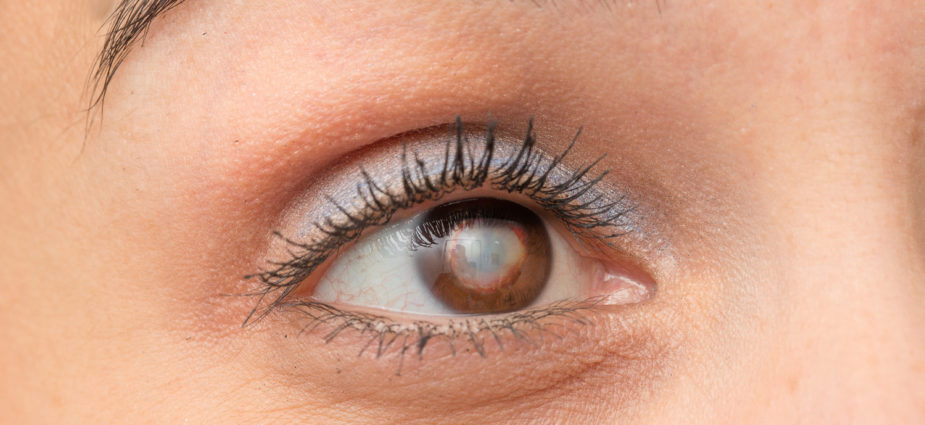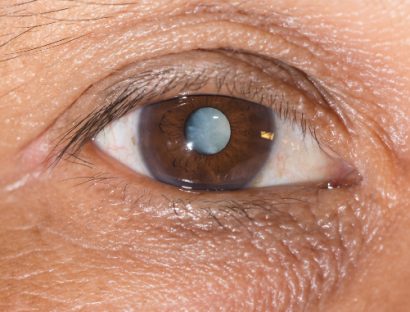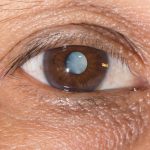Cataracts
Medically Reviewed by: Dr. David Evans

Cloudy Vision Sign of a Cataract?
Has your vision become cloudy? Are colors less vibrant than they used to be? Do you find that you need brighter light to read? If you answered yes to any of these questions, you may have a cataract.
A cataract is a clouding of the lens in your eye. Cataracts usually occur due to aging, but there are other causes as well. In rare cases, a person may even be born with cataracts.
Watch a brief introduction to cataracts, or continue below for information about the symptoms, causes and treatments of cataracts.
The Eye’s Lens
The lens is a component of the eye located behind the iris and pupil. It is comprised of water and protein fibers and has three principle features: the capsule (on the outside), a middle layer called the cortex and, at the center, the nucleus. A healthy lens with no cataract is clear.
Up until it begins to deteriorate, the lens is clear and flexible and can change shape. Together, the lens works with the cornea to focus light onto the retina to produce visual images. The ability of the lens and cornea to perform this task allows us to see clearly at multiple distances. If this ability is compromised for any reason (e.g., a cataract), our vision becomes less clear.
Causes of Cataracts
A cataract occurs when the protein fibers in the lens begin to break down and form clumps that become cloudy or opaque. It is unclear exactly what causes this to happen, but many experts believe that it occurs through oxidation by free radicals (unstable molecules). Free radicals can stem from any number of sources. For example, smoking and UV radiation are both sources of free radicals — and both are associated with cataracts.
Cataracts can also occur as a result of an injury to the eye or long-term use of certain medications such as steroids. A cataract can also be present at birth. (Check out our post on congenital cataracts.)
Cataract Symptoms
The most common symptoms of cataracts are:
- Problems with night vision
- Glare and sensitivity to light
- Blurry vision
- Colors seem washed out or less vibrant
- Double vision
- The need to change your glasses prescription continually
- The need for brighter light when reading

Cataracts do not hurt or cause redness or itchiness, so if you are experiencing these symptoms, it’s something other than a cataract. In some cases, your doctor may notice the early formation of a cataract without you experiencing any symptoms at all.
Risk Factors
Aging is the main factor associated with cataracts. About half of people over 65 have cataracts and around 70 percent of people over the age of 75 have them.
Other factors associated with cataracts include the following:
- Diabetes
- Smoking
- Eye injury
- Inflammation
- Long-term exposure to UV radiation from the sun
- Exposure to ionizing radiation
- Long-term use of corticosteroids
- Effects of previous eye surgeries
Treatment for Cataracts
Once a cataract has formed, it cannot heal itself or be healed, and vision loss cannot be restored with glasses or contacts. But luckily, the cataract can be removed and replaced with an artificial intraocular lens (IOL) to restore your vision.
Some cataracts do not require surgery. It depends how severe your visual symptoms are. But note that even if you can pass an eye exam, your cataract still might affect your night vision.
It’s a good idea to have a cataract removed as soon as you notice it. The longer you wait, the higher the risk of complications, due to aging and because the cataract will continue to become denser and therefore more difficult for the surgeon to treat.
Don’t be nervous; cataract surgery is safe, and more than 95 percent of patients have better vision following the procedure. These days there are artificial lenses to correct not just nearsightedness and farsightedness but also presbyopia and astigmatism. The sooner you have surgery, the sooner you’ll have clear vision again. Laser cataract surgery may also be an option for you, a procedure some experts believe to be even better than the traditional option.




